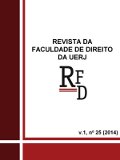A POLÍTICA, A CONSTITUIÇÃO E O NOMOS: As Teorias Constitucionais de Schmitt e Arendt. / POLITICS, CONSTITUTION AND NOMOS: The Constitutional Theories of Schmitt and Arendt
DOI:
https://doi.org/10.12957/rfd.2014.11662Palavras-chave:
Hannah Arendt, Carl Schmitt, Nomos, Normativismo.Resumo
DOI: http://dx.doi.org/10.12957/10.12957/rfd.2014.11662
O presente artigo pretende fazer uma análise e, posteriormente, um cotejamento de conceitosdas filosofias constitucionais de Hannah Arendt e Carl Schmitt. Não obstante as divergênciasideológicas que separam os dois autores, a hipótese do artigo é que certas afinidades teóricaspossibilitam uma explicação do fenômeno constitucional em uma perspectiva política. Talperspectiva é extremamente relevante para o estado atual do debate acerca da relação entrepolítica e constituição – dominado por uma visão que os aparta e silencia a primeira. Nessatoada, com o intuito de introduzir a discussão, é feito um breve panorama de suas teorias ebiografias com o escopo de contextualizá-los histórica, política e filosoficamente. Mais adiante,os conceitos de “unidade”, “representação”, “identidade” e de “político”, da obra de Schmitt,são comparados com os de “poder”, “liberdade”, “ação” e “mundo comum”, do arcabouçoteórico arendtiano. Tal cotejamento objetiva demonstrar que os autores fundamentam suasteorias políticas e constitucionais em uma visão semelhante do fenômeno político. Por fim,chega-se ao conceito de Nomos, cujo sentido permite compreender a relação entre política econstituição na obra de ambos os autores. É que o supracitado conceito permite analisar apolítica e a ordem constitucional através de uma perspectiva dinâmica, inserindo a política nointerior da estrutura constitucional e alçando a primeira ao status de conditio sine qua non defundação e existência da segunda.
Downloads
Publicado
Como Citar
Edição
Seção
Licença
Direitos Autorais
oArtigos publicados na Revista da Faculdade de Direito da UERJ (RFD/UERJ)
Os Direitos autorais dos artigos publicados pertencem à Revista da Faculdade de Direito da UERJ (RFD/UERJ). É permitida a reprodução total ou parcial dos artigos desde que citada a fonte.
oReprodução parcial de outras publicações
Artigos submetidos que contiverem partes de texto extraídas de outras publicações deverão obedecer aos limites especificados para garantir originalidade do trabalho submetido. Plágio em todas as suas formas constitui comportamento antiético e é inaceitável.
Recomenda-se evitar a reprodução de tabelas e ilustrações, extraídas de outras publicações. O artigo que contiver reprodução de uma ou mais tabelas e/ou ilustrações de outras publicações só será encaminhado para análise se vier acompanhado de permissão escrita do detentor do direito autoral do trabalho original para a reprodução especificada na Revista da Faculdade de Direito da UERJ (RFD/UERJ). A permissão deve ser endereçada ao autor do trabalho submetido. Em nenhuma circunstância a Revista da Faculdade de Direito da UERJ (RFD/UERJ) e os autores dos trabalhos publicados nesta revista repassarão direitos assim obtidos.
·Os trabalhos não aceitos para a publicação serão devolvidos aos autores, se solicitado.
A Revista da Faculdade de Direito está licenciada com uma Licença Creative Commons Atribuição 4.0 Internacional.
Este trabalho está licenciado sob uma Licença Creative Commons 4.0, Atribuição-Sem Derivações.
Esta licença permite copiar e redistribuir o material em qualquer suporte ou format para qualquer fim, mesmo que comercial, desde de que citada a autoria original.











